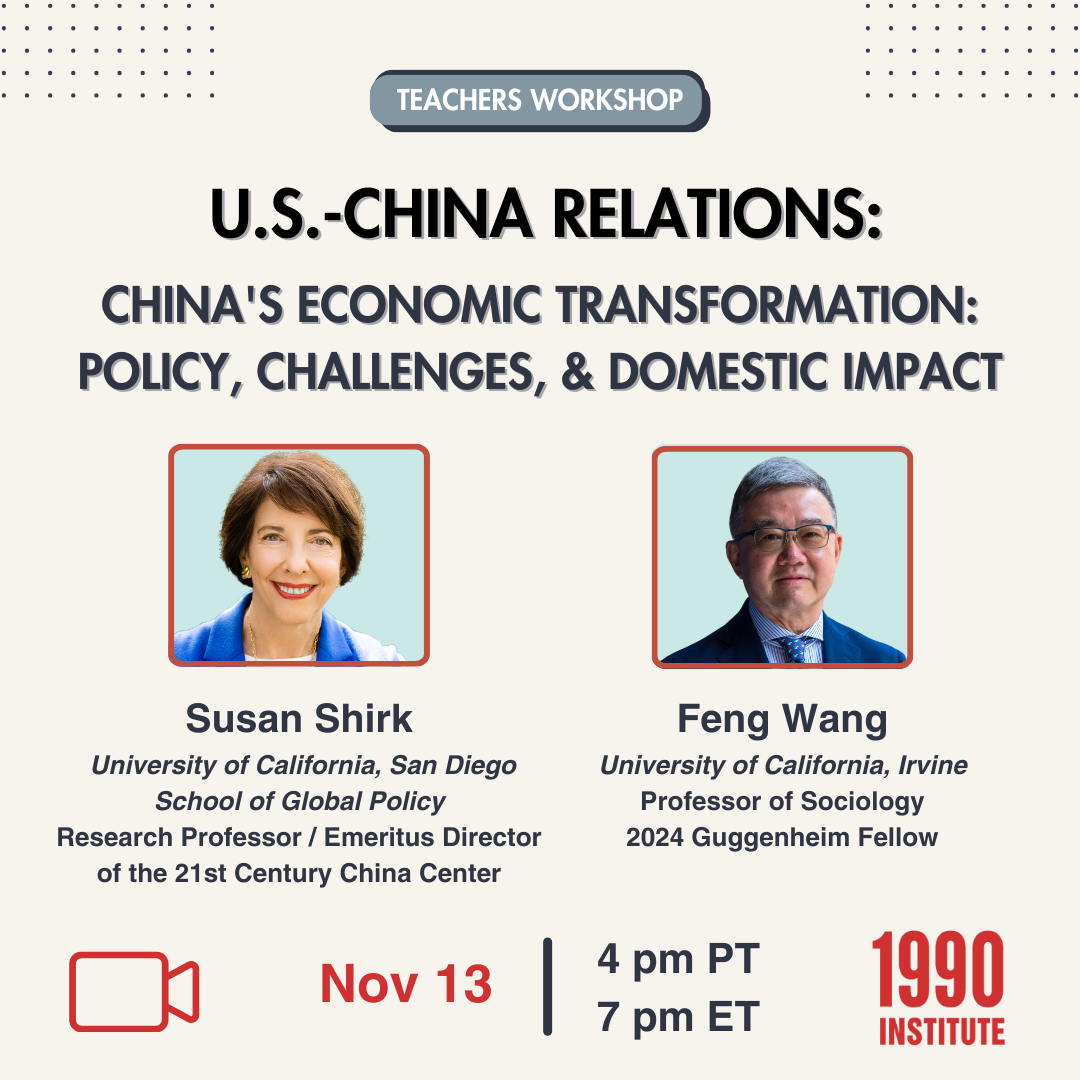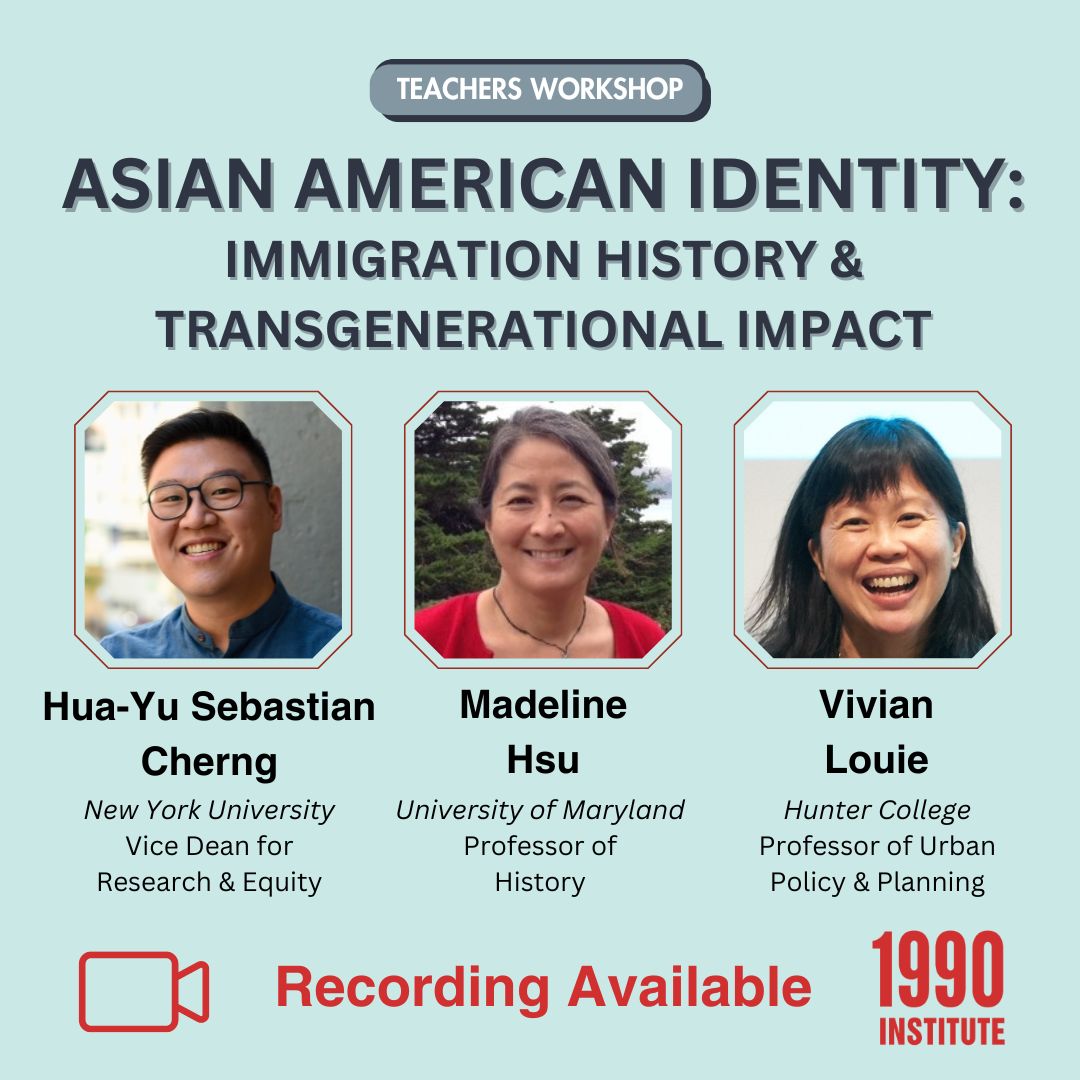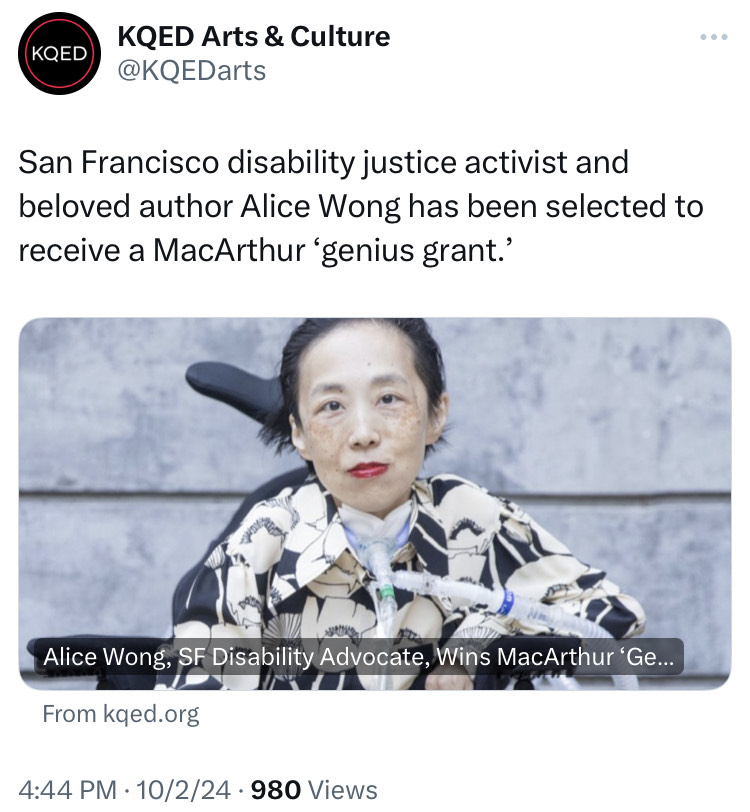|
|
|
|
|
|
|
|
Dear Friends, We have an abundance of news to share with you this month. First, October is Filipino American History Month. Throughout American history, since the first recorded presence of Filipinos in the continental U.S. in 1597, there have been instances of struggle, resistance, solidarity, and resilience, as well as love and joy. We are highlighting Filipino Americans on New Asian American Voices and have curated resources to share with students to learn more about Larry Itliong and Philip Vera Cruz, both key leaders of the Delano Grape Strike of 1965. For more on the history of Asian Americans, see our video titled “Waves of Immigrants: The Asian American Journey.” Next, we’re pleased to announce that our upcoming virtual Teachers Workshop will be the first of a two-part series on China’s economy. This first workshop will be on November 13 and will explore the complexities of China's economic evolution over the past 40 years, focusing on the role of the government in shaping the country's economic trajectory and its broader domestic implications. We welcome our two esteemed speakers: Susan Shirk is a research professor and the director emeritus of the 21st Century China Center at the School of Global Policy and Strategy at the University of California, San Diego. She is one of the most influential experts working on U.S.-China relations and Chinese politics in the U.S. and is a member of the 1990 Institute’s Advisory Council. Feng Wang is a professor of sociology at the University of California, Irvine, and a 2024 Guggenheim Fellow. Secure your spot, and mark your calendars – the second part of this series on March 24, 2025 will focus on the impact of China’s economic evolution on the United States and the global community. If you missed our September webinar, “Asian American Identity: Immigration History & Transgenerational Impact,” the recording and lesson plan are now available, and our curated resources are in our Reference Library and Teachers Portal. Early voting has started in many areas for the local, state, and Presidential election on November 5. Don't miss our series of videos on the importance of voting that bring civic engagement to you and your classroom. We also have curated references for in-depth information on our website. We encourage everyone to register to vote and make sure your voice is heard in every election. In addition, we are pleased to announce the winners of the 2024 China Focus essay contest. This year’s essays focused on student exchange between the U.S. and China or on China as a global mediator. Details for our program updates are in Spotlight below. Finally, but importantly, the 1990 Institute strongly condemns the passage of H.R. 1398 by the U.S. House of Representatives. H.R.1398 is legislation that seeks to “reestablish” the China Initiative. Similar to the original China Initiative, this bill is likely to exacerbate the already high levels of discrimination that Asian Americans endure without addressing legitimate national security concerns. Although too often treated as dangerous outsiders, Asian Americans have been a vital and positive part of the fabric of American life for hundreds of years. The 1990 Institute urges both the House and the Senate to reconsider this legislation and its implications. Read our full statement on our website. If you are able to make a charitable contribution of any amount, we would be grateful to continue our work. Please share our newsletters with your friends and family and encourage them to subscribe. |
|
|
|
 |
|
|
|
|
|
|
Are you ready to vote? These new American voters and Asian American voters are. By Frances Kai-Hwa Wang When my friend Krishna became a naturalized U.S. citizen, the first thing he did was ask the judge for a voter registration form. Then he went to buy a grill. “I wanted one that was big! I came home and hung both Cambodian and American flags side-by-side to start a new journey as a Cambodian American,” he said. As an immigrant, Krishna understands the power of his vote. Now immigrants and refugees who have become citizens and voters are becoming recognized as an emerging voting bloc – New American voters. In 2020, one in 10 eligible voters was an immigrant, double what it was in 2000, according to Pew Research Center. Between 2015 and 2020, about 5 million immigrants and refugees became U.S. citizens and many voted for the first time in the 2020 presidential election, according to National Partnership for New Americans. Since the last presidential election in 2020, more than 3.5 million adults of voting age have naturalized and will also be eligible to vote in this year’s election. “Some new American voters have been citizens for many years but because of multiple barriers to voting, such as language access, access to information about the elections, transportation needs, have difficulty in casting their ballots,” said Becky Belcore, co-director of the nonprofit National Korean American Service and Education Consortium (NAKASEC). Some people decided to naturalize as anti-immigrant rhetoric increased, to have more protections and rights. Some states offered better resources to assist immigrants and refugees to naturalize. Some community-based organizations like Adoptees for Justice and Michigan United helped low-income communities with fees, citizenship classes, and English classes. In contrast with the low voter turnout in general, 96 percent of new American voters said that they definitely or probably will vote in this year’s election. Eighty-two percent said that they are paying some or a lot of attention to the election, and 83 percent say that protecting democracy and government institutions are very or somewhat important for their vote. With Vice President Kamala Harris running for president, this is an especially exciting race for Asian Americans. In a new poll of Asian American voters conducted in August 2024 by NAKASEC, about 95 percent of Asian American voters said that they definitely or probably will vote in the upcoming presidential election. It also found that Asian Americans strongly favor VP Harris (70.1 percent) over former president Donald Trump (22.3 percent). Almost 70 percent of Asian American voters believe that when China is depicted as a threat, Asian Americans are negatively impacted. With less than four weeks left until election day, it is time to make your voting plan today, for you and your family, including your young adults and your elders. Register to vote. Find out where your polling place is. Request an absentee ballot if you need one. If voting absentee, mail back your ballot as soon as possible to ensure that it arrives at your clerk’s office on time. Help your elders who need assistance getting a translated ballot or going to the polls. Discuss the issues and the candidates with your families to dispel misinformation and disinformation. Check out these 1990 Institute voting videos for more information. |
|
|
|
|
|
 |
Missed our September workshop? Deepen your understanding of Asian American identity and its immigration history by viewing the recording and accessing the lesson plan, presentation, and additional resources. |
|
|
|
|
|
|
|
Connie Chung reflects on her trailblazing career and confronting rampant sexism | PBS News Hour Connie Chung covered everything from the Watergate scandal to conflict overseas. Her new memoir, “Connie,” paints a fuller picture of what actually unfolded behind the scenes. Asian Americans see mixed results in enrollment after end of affirmative action | NBC News Asian American enrollment at Columbia and Brown rose, while it decreased at Yale, Dartmouth and Princeton. Harvard remained the same. Widespread adoption fraud separated generations of Korean children from their families | Associated Press and Frontline South Korea's Adoption Reckoning. Western nations were desperate for Korean babies. Now many adoptees believe they were stolen. During ‘China Week,’ House GOP revived surveillance program. Asian Americans are slamming it. | NBC News “Originally a Trump-era initiative sold as a national security measure, the China Initiative instead turned out to be a witch hunt,” civil rights groups said. North Korea and China mark their 75th anniversary of ties as outsiders question their relationship | Associated Press Leaders of North Korea and China marked the 75th anniversary of their diplomatic relations on Sunday by exchanging messages that expressed hopes for stronger ties. Young Chinese are ‘retiring’ in the countryside as China’s unemployment woes grate | CNBC Job hunting has been particularly difficult for young people as the Chinese economy struggles. Fed up with China’s employment situation, young people on the mainland are retreating to the countryside. ‘No challenges can stop China’s progress’ Xi Jinping says in 75th anniversary speech | CNBC Chinese President Xi Jinping said Monday that no challenges can stop the country from moving forward. He also reiterated Beijing’s aims for reunification with Taiwan. ‘A very old political trope’: the racist US history behind Trump’s Haitian pet eater claim | The Guardian Trump’s bizarre rant about pet-eating Haitians is just the latest in a long US tradition of scapegoating immigrants. Delaware codifies Hispanic, Asian American, and Pacific Islander commissions along with groundbreaking education bill | WHYY Legislation has been signed creating the state’s Asian American and Pacific Islander Commission as well as mandating that the groups’ history – and the history of all racial and ethnic groups – be included in Delaware’s K-12 curriculum. ‘Yellow Face’ Review: Daniel Dae Kim Leads a Witty, Powerful Broadway Staging of David Henry Hwang’s Comedy | Variety “Yellow Face,” produced on Broadway for the first time after an initial Off Broadway run in 2007, might be the prolific Hwang’s magnum opus, but it’s also wily, wry, and slippery. |
|
|
|
|
|
|
|
|
|
|
|
- TEACHERS WORKSHOP ON CHINA’S ECONOMIC TRANSFORMATION ON NOVEMBER 13 – China's Economic Transformation: Policy, Challenges, & Domestic Impact on November 13 will be the first workshop in a two-part series on China’s economy. Topics will include China's internal challenges, such as unemployment, rising national debt, and the government's shifting policies. Attendees will also gain insights into the impact of COVID-19 and the ongoing transformation of China's economy and society. Educators who participate will be equipped to help students understand these issues. The workshop will also address how to present these complex dynamics to students in a relatable and impactful way. Register for free and join us on November 13 at 4 pm PT / 7 pm ET. Our workshops are open to everyone interested in the topics.
- RECORDING AVAILABLE: TEACHERS WORKSHOP ON ASIAN AMERICAN IDENTITY AND IMMIGRATION – The 1990 Institute hosted a virtual workshop, “Asian American Identity: Immigration History & Transgenerational Impact,” on September 18 that explored the rich history of Asian immigration to the U.S. and how it shapes identity today. We were thrilled to see registrations from 28 states nationwide with especially strong representation from CA, NY, CT, TX, PA, MA, and CT. This insightful webinar featured speakers Madeline Hsu at the University of Maryland, Vivian Louie at Hunter College, and Hua-Yu Sebastian Cherng at New York University. Watch the recording and check out our Teachers Portal and Reference Library for more multimedia resources. We also created a downloadable lesson plan to help educators engage students with this critical topic. Request your copy through this form.
- 2024 ESSAY CONTEST WINNERS – Thank you to all who entered this year’s China Focus Essay Contest and congratulations to the three winners of the 1990 Institute Prizes. The winning essay is by Jiawen Lin, who is in a master’s program at the School of International Relations and Diplomacy at Beijing Foreign Studies University. Her essay, “Rebuilding Sino-U.S. Cultural Exchanges: Personal Reflections” (“重建中美人文交流: 一个亲历者的思考”), addresses how people-to-people ties that are formed through the U.S. and China’s ongoing exchange of students help to stabilize the countries’ relationship. Runner-up Mustapha Dukuly also discusses this topic in “The Future of the U.S.-China Educational Exchanges.” He is a Master of Public Administration candidate at Columbia University's School of International and Public Affairs. Payton Morlock, another runner-up, wrote “Kingdom in the Middle: China as an International Mediator,” which evaluates the geopolitical implications and potential obstacles surrounding China’s newfound role as an international mediator. He is a Master of Chinese Economic and Political Affairs student at the UC San Diego School of Global Policy and Strategy. Visit our website for more on this contest and the winning essays.
|
|
|
|
Dim Sum - A Little Bit of Heart |
|
 |
|
|
|
|
|
|
|
|
|
|
|
|
1990 Institute
P.O. Box 383 | San Francisco, California 94104
contact@1990institute.org www.1990institute.org Copyright 2023 The 1990 Institute. All rights reserved. |
|
|
|
|
|
|
|
|
|
|
|
|
|